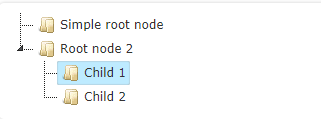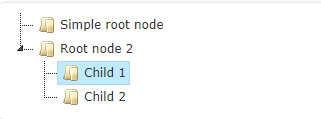概述:
前面主要是html数据,这里主要是json数组
1.格式
jsTree需要一个具体格式JSON数据,在标准的语法没有那个字段是必须的-而是那些是你需要的。请记住你可以获取任何你请求的其他属性,jsTree将会不会碰他们,你将有可能在随后使用它们。
为了改变节点的图标你可以是用属性icon。具体的字符串需要包含/的一个图片的url路径,你可以使用任何其它字符串应用类样式去修饰<i>元素,它将会被用呈现这个图标。你可以使用boolean 值false来jsTree在渲染节点时没有图标。
你可以设置一个节点的状态使用state属性,它值可以使如下值得组合:opened, selected, disabled.
li_attr和a_attr可以直接通过jQuery属性函数获取。
当使用AJAX设置children为false,jsTree将会将渲染这个节点为关闭状态,如果需要打开的时候需要发送额外的请求。
如何内部children都应该遵循相同的格式,或者是普通字符串(这个字符串作为普通文本和任何其它自动生成的)
- // Expected format of the node (there are no required fields)
- {
- id : "string" // will be autogenerated if omitted
- text : "string" // node text
- icon : "string" // string for custom
- state : {
- opened : boolean // is the node open
- disabled : boolean // is the node disabled
- selected : boolean // is the node selected
- },
- children : [] // array of strings or objects
- li_attr : {} // attributes for the generated LI node
- a_attr : {} // attributes for the generated A node
- }
2.可选择JSON格式
如果你不想使用内部children的方式,你可以使用可选语法,每个节点需要包含两个必须字段:id和parent,没有children属性(其它都保持这个格式)
jsTree 将会自动构建这个层次关系,为表明一个节点应该是根节点可是设置parent属性为"#".
这个种方式大多数用于一次性渲染整棵树,这个数据存储在数据库之间有联结关系。
- // Alternative format of the node (id & parent are required)
- {
- id : "string" // required
- parent : "string" // required
- text : "string" // node text
- icon : "string" // string for custom
- state : {
- opened : boolean // is the node open
- disabled : boolean // is the node disabled
- selected : boolean // is the node selected
- },
- li_attr : {} // attributes for the generated LI node
- a_attr : {} // attributes for the generated A node
- }
3.使用JSON
为了使用JSON来渲染一棵树,你需要使用$.jstree.defaults.core.data配置选项
这个希望格式为一个数组节点。每个节点应该是一个如上所描述的对象或者是一个简单的字符串(这种情况字符串被用来作为一个节点的文本替换自动生成的文本),任何内部子节点格式是一样的。
- $('#using_json').jstree({ 'core' : {
- 'data' : [
- 'Simple root node',
- {
- 'text' : 'Root node 2',
- 'state' : {
- 'opened' : true,
- 'selected' : true
- },
- 'children' : [
- { 'text' : 'Child 1' },
- 'Child 2'
- ]
- }
- ]
- } });

4.使用可选json格式
- $('#using_json_2').jstree({ 'core' : {
- 'data' : [
- { "id" : "ajson1", "parent" : "#", "text" : "Simple root node" },
- { "id" : "ajson2", "parent" : "#", "text" : "Root node 2" },
- { "id" : "ajson3", "parent" : "ajson2", "text" : "Child 1" },
- { "id" : "ajson4", "parent" : "ajson2", "text" : "Child 2" },
- ]
- } });

5.使用AJAX
你可以使用AJAX向服务器请求返回一个json数据来渲染树,这个格式如上所示,这里唯一不同就是JSON是不可见,它是服务器返回的。
为了使用这个特性,你需要使用$.jstree.defaults.core.data 配置选项
仅仅是使用标准jquery像AJAX配置和jstree将会自动做出一个AJAX请求而返回数据。
除了标准jQuery ajax选项,你可以提供data函数和url路径,这个功能将会运行当前的实例范围内,一个参数被通过表明这个节点被加载了,这个返回值将会用作各自的URL和data
如果你并不会返回json头部信息,至少设置数据类型 jQuery AJAX的选项为“json”
- $('#tree').jstree({
- 'core' : {
- 'data' : {
- 'url' : function (node) {
- return node.id === '#' ?
- 'ajax_roots.json' :
- 'ajax_children.json';
- },
- 'data' : function (node) {
- return { 'id' : node.id };
- }
- }
- });

6.使用函数
你可以提供一个函数,这个函数将会接受两个参数,节点加载和回调函数。
- $('#tree').jstree({
- 'core' : {
- 'data' : function (obj, cb) {
- cb.call(this,
- ['Root 1', 'Root 2']);
- }
- }});
